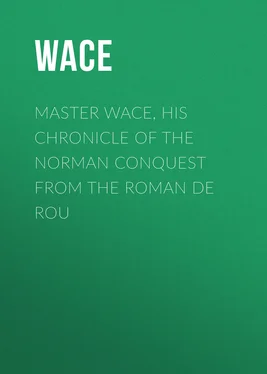Wace - Master Wace, His Chronicle of the Norman Conquest From the Roman De Rou
Здесь есть возможность читать онлайн «Wace - Master Wace, His Chronicle of the Norman Conquest From the Roman De Rou» — ознакомительный отрывок электронной книги совершенно бесплатно, а после прочтения отрывка купить полную версию. В некоторых случаях можно слушать аудио, скачать через торрент в формате fb2 и присутствует краткое содержание. Жанр: foreign_prose, История, foreign_edu, foreign_antique, на английском языке. Описание произведения, (предисловие) а так же отзывы посетителей доступны на портале библиотеки ЛибКат.
- Название:Master Wace, His Chronicle of the Norman Conquest From the Roman De Rou
- Автор:
- Жанр:
- Год:неизвестен
- ISBN:нет данных
- Рейтинг книги:4 / 5. Голосов: 1
-
Избранное:Добавить в избранное
- Отзывы:
-
Ваша оценка:
- 80
- 1
- 2
- 3
- 4
- 5
Master Wace, His Chronicle of the Norman Conquest From the Roman De Rou: краткое содержание, описание и аннотация
Предлагаем к чтению аннотацию, описание, краткое содержание или предисловие (зависит от того, что написал сам автор книги «Master Wace, His Chronicle of the Norman Conquest From the Roman De Rou»). Если вы не нашли необходимую информацию о книге — напишите в комментариях, мы постараемся отыскать её.
Master Wace, His Chronicle of the Norman Conquest From the Roman De Rou — читать онлайн ознакомительный отрывок
Ниже представлен текст книги, разбитый по страницам. Система сохранения места последней прочитанной страницы, позволяет с удобством читать онлайн бесплатно книгу «Master Wace, His Chronicle of the Norman Conquest From the Roman De Rou», без необходимости каждый раз заново искать на чём Вы остановились. Поставьте закладку, и сможете в любой момент перейти на страницу, на которой закончили чтение.
Интервал:
Закладка:
There was great press to raise the king up, and they soon remounted him. He had fallen among his men, and was no way hurt nor injured: so he arose up nimbly and boldly; never more so. As soon as he was on horseback, many were the vassals who were again to be seen striking with lance and sword; Frenchmen assaulting Normans, and Normans turning, dispersing, and moving off the field: and the king shewed himself every where in order to encourage his men, as he had been seen to fall.
[Then Hamon-as-denz was beaten down, and I know not how many of his kindred with him, who never returned home thence, save as they might be borne home on their biers. Dan as-denz was a Norman, very powerful in his fief, and in his men. He was Lord of Thorigny, of Mezi 40 40 Maissy, arrondissement of Bayeux.
, and of Croillie 41 41 Creully, Croleium, or Credolium, in the arrondissement of Caen; celebrated for its castle, and the lords of the name, who also held among others the chateau de Gratot. Mém. Ant. Norm . ii. 251. Thorigny and Creully passed with one of Robert Fitz Hamon's daughters to Robert, Earl of Gloucester, natural son of Henry I.
. He had fought on all day, striking down the Frenchmen, and crying out SAINT AMANT! but a Frenchman marked him carrying himself thus proudly; so he stood still on one side, and watched him until he came near; and when he saw him turn and strike the king 42 42 The Chronicle of Normandy says it was Guillesen, uncle of Hamon, who overthrew the king; William of Malmesbury says it was Hamon himself. There is some obscurity in the account of this assault on the king. The passage marked with brackets looks like merely another version of the incident just before related; thus incorporating perhaps the various readings of two MSS. instead of selecting one.
, the Frenchman charged forward with great force, and struck him gallantly, so that he fell upon his shield. I know not exactly how he was wounded, but only that he was carried away on his shield dead; and was borne thence to Esquai 43 43 Notre dame d'Esquai is on the banks of the Orne, near Vieux. There is, however, another Esquai, a league from Bayeux.
, and buried before the church. Many were the people who saw this feat done; how Hamon struck the king, and beat him off his horse, and how the French killed him for it, taking vengeance for their king.]
Raol Tesson stood by and looked on, till he saw the two hosts meeting, and the knights jousting; then he rode forward, and his course was easy to be marked. I know not how to recount his high deeds, nor how many he overthrew on that day.
Renouf the Viscount (I will not dwell long on the story) had with him a vassal named Hardé 44 44 The Chronicle of Normandy calls him Bardon; Dumoulin says he was nephew to Grimoult. Another MS. reads Hardré.
, born and bred at Bayeux, who rode in the front of all, and gloried much in his prowess; William rushed against him, sword in hand, and aiming his blow aright, drove the trenchant steel into his body below the chin, between the throat and the chest, his armour not saving him. The body fell backward to the earth, and the soul passed away therefrom.
Renouf saw how the combat raged; he heard the clamour, the cry of war, and the clashing of lances; and he stood still, and was astounded, like one whose heart is faint. He feared much lest he were betrayed, and lest Neel had fled; and he was greatly afraid of William, and of the people who were with him. Evil betide him, he thought, if he were taken, and worse still would it be to be killed. He repented of having put on his armour, and was eager to get out of the battle; so he wandered in front and in rear, and at last, separating himself from his companions, determined to flee. Accordingly he threw away his lance and shield, and took to flight, running off with outstretched neck. Those about him who were cowards accompanied his flight, complaining much more than they had any occasion.
But Neel fought on gallantly; and if all had been like him, the French king would have come in an evil hour, for his men would have been discomfited and conquered. He was called on account of his valour and skill, his bravery and noble bearing, CHIEF DE FAUCON;—NOBLE CHIEF DE FAUCON was his title. He gave and received many a blow, and did all that lay in his power; but his strength began to fail; he saw that many of his men were lying dead, and that the French force increased on all sides, while the Normans fell away. Some fell wounded around him; some took fright and fled; and Neel at length quitted the field with more regret than he had ever before felt.
I will not tell, and in truth I do not know, (for I was not there to see, and I have not found it written) which of those present fought best; but this I know, that the king conquered, and that Renouf fled from the field. The crowd of fugitives was great, and the press of the pursuers was great also. Horses were to be seen running loose, and knights spurring across the plain. They sought to escape into the Bessin, but feared to cross the Osgne 45 45 The Orne.
. All fled in confusion between Alemaigne and Fontenai 46 46 Allemagne and St. André de Fontenay, both in the arrondissement of Caen. There was an abbey of ancient foundation at the latter.
; by fives, by sixes, and by threes, while the pursuers followed, pressing hard upon and destroying them. So many of them were driven into the Osgne, and killed or drowned there, as that the mills of Borbillon 47 47 The Chronicle of Normandy reports the same.
, they say, were stopped by the dead bodies.
And the king then gathered together his men, to return each into his own land. The sick and wounded were carried away, and the dead were buried in the cemeteries of the country.
William remained in his own land, and for a long while there was no more war. The barons came to accord with him, and paid such fines, and made him such fair promises, that he granted them peace, and acquittance of all their offences. But Neel could not come to an arrangement with him, and dare not stay in the land; so he remained long in Brittany before any accord was come to. Gui retreated from Valedune and fled to Brione; and William followed hard after him, and shut him up in a strong castle. In those days there was a fortress standing on an island of the river Risle 48 48 Brionne is on the Risle. The castle here described must not be confounded with the one whose remains still exist. There is no vestige of the old castle on the island. See an article on Brionne in Mém. Ant. Norm . iv. 415. Ordericus Vitalis says the siege lasted three years.
, which surrounds the fortress and the mansion. And there, in Brione, Gui was shut up; but he had neither peace nor rest, and was in great bodily fear. The duke built up two castles near; so that provisions failing, and the besiegers pressing him hard, Gui surrendered up Brione and Vernun, when he could get no better terms. He might have remained with the duke, who would have provided for him; but he did not stay long; there was no friendship between them; so he went away to Burguine 49 49 Burgundy.
, to the country where he was born.
When the other Norman barons saw that the duke had obtained the upper hand of them all, they delivered hostages to keep the peace, and did fealty and homage to him. They obeyed him as their lord, and pulled down the new castles, and willingly or unwillingly rendered their service. He seized Grimoult del Plesseiz, and put him in prison at Rouen; and he had very good cause for so doing; for Grimoult would have murdered him traitorously, as we have said, at Valognes, had not Golet the fool given him warning. Grimoult confessed the felony, and accused of fellowship in it a knight called Salle 50 50 The name Salle and Saulz occurs in this district in Gallia Christiana . There is a Saulx-mesnil near Valognes, the scene of the treachery planned against William.
, who had Huon for his father. Salle offered to defend himself from the charge, and a single combat was thereupon arranged between them; but when the appointed day came, Grimoult was found dead in the prison. It occasioned great talk; and he was buried, chained as he was, with the irons on his legs. At Bayeux, when the church was dedicated, part of Grimoult's lands was granted to Our Lady the Blessed Mary; and part divided in the abbey, to each his share 51 51 The charter of donation to Bayeux is in Gallia Christiana , and is dated 1074. Among the witnesses are Robert Fitz Hamon, son of one of the traitors, and Eudo Dupifer, one of Hubert de Rie's sons. The curious inquest of the possessions of the see of Bayeux, (taken temp. Hen. I. and printed in Mém. Ant. Norm . vol. viii.) of which the list of Bayeux knights in the Norman Roll of the Red book is only an abridgement, says, in speaking of Grimoult, 'in carcere regis apud Rothomagum mortuus est; et sepultus in cimiterio Sti. Gervasii extra villam; habens adhuc tibias in compedibus ferreis, in signum proditionis, de quâ erat ab ipso rege accusatus.' In the roll, which agrees with the inquest, is this entry, 'Feodum Grimundi de Plesseiz erat fœdum 8 mil. cum terrâ de Bougeio et de Danvou, quam Grimundus dederat Willelmo de Albinneio cum sorore sua in maritagio.' Further particulars are given in the inquest, and in the Bull of Eugenius III. 1144, also printed in Mém. Ant. Norm . viii. The word 'abbey' is probably only used here by Wace to suit his rhyme; though the Chronicle of Normandy, improving upon the error, says the abbey of Caen. Wace meant to allude to an appropriation of Grimoult's lands among the prebends; and in fact, in the Bayeux inquest, it is stated that Odo created out of them seven prebends; retaining in demesne Plessis, and the forest of Montpinçon.
.
Интервал:
Закладка:
Похожие книги на «Master Wace, His Chronicle of the Norman Conquest From the Roman De Rou»
Представляем Вашему вниманию похожие книги на «Master Wace, His Chronicle of the Norman Conquest From the Roman De Rou» списком для выбора. Мы отобрали схожую по названию и смыслу литературу в надежде предоставить читателям больше вариантов отыскать новые, интересные, ещё непрочитанные произведения.
Обсуждение, отзывы о книге «Master Wace, His Chronicle of the Norman Conquest From the Roman De Rou» и просто собственные мнения читателей. Оставьте ваши комментарии, напишите, что Вы думаете о произведении, его смысле или главных героях. Укажите что конкретно понравилось, а что нет, и почему Вы так считаете.












